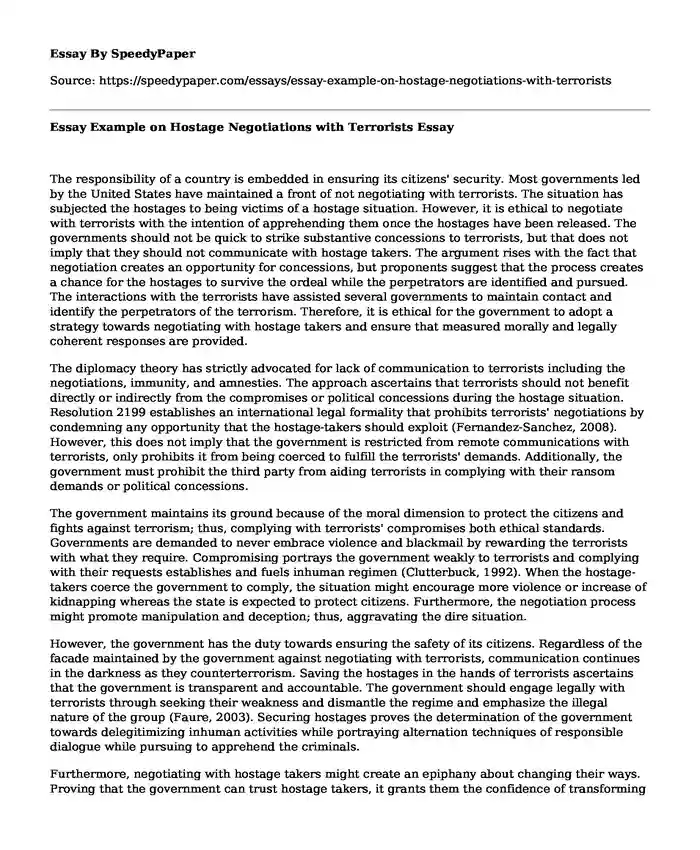
| Type of paper: | Course work |
| Categories: | Terrorism National security |
| Pages: | 3 |
| Wordcount: | 591 words |
The responsibility of a country is embedded in ensuring its citizens' security. Most governments led by the United States have maintained a front of not negotiating with terrorists. The situation has subjected the hostages to being victims of a hostage situation. However, it is ethical to negotiate with terrorists with the intention of apprehending them once the hostages have been released. The governments should not be quick to strike substantive concessions to terrorists, but that does not imply that they should not communicate with hostage takers. The argument rises with the fact that negotiation creates an opportunity for concessions, but proponents suggest that the process creates a chance for the hostages to survive the ordeal while the perpetrators are identified and pursued. The interactions with the terrorists have assisted several governments to maintain contact and identify the perpetrators of the terrorism. Therefore, it is ethical for the government to adopt a strategy towards negotiating with hostage takers and ensure that measured morally and legally coherent responses are provided.
The diplomacy theory has strictly advocated for lack of communication to terrorists including the negotiations, immunity, and amnesties. The approach ascertains that terrorists should not benefit directly or indirectly from the compromises or political concessions during the hostage situation. Resolution 2199 establishes an international legal formality that prohibits terrorists' negotiations by condemning any opportunity that the hostage-takers should exploit (Fernandez-Sanchez, 2008). However, this does not imply that the government is restricted from remote communications with terrorists, only prohibits it from being coerced to fulfill the terrorists' demands. Additionally, the government must prohibit the third party from aiding terrorists in complying with their ransom demands or political concessions.
The government maintains its ground because of the moral dimension to protect the citizens and fights against terrorism; thus, complying with terrorists' compromises both ethical standards. Governments are demanded to never embrace violence and blackmail by rewarding the terrorists with what they require. Compromising portrays the government weakly to terrorists and complying with their requests establishes and fuels inhuman regimen (Clutterbuck, 1992). When the hostage-takers coerce the government to comply, the situation might encourage more violence or increase of kidnapping whereas the state is expected to protect citizens. Furthermore, the negotiation process might promote manipulation and deception; thus, aggravating the dire situation.
However, the government has the duty towards ensuring the safety of its citizens. Regardless of the facade maintained by the government against negotiating with terrorists, communication continues in the darkness as they counterterrorism. Saving the hostages in the hands of terrorists ascertains that the government is transparent and accountable. The government should engage legally with terrorists through seeking their weakness and dismantle the regime and emphasize the illegal nature of the group (Faure, 2003). Securing hostages proves the determination of the government towards delegitimizing inhuman activities while portraying alternation techniques of responsible dialogue while pursuing to apprehend the criminals.
Furthermore, negotiating with hostage takers might create an epiphany about changing their ways. Proving that the government can trust hostage takers, it grants them the confidence of transforming their ways legitimately. Therefore, negotiations should not be dismissed fast unless there are doubts and illegal dealings involved during the process; the government should observe that democratic protocol is upheld. Government involving itself in a legal and holistic process that would save lives should be applauded and implemented.
References
Clutterbuck, R. (1992). Negotiating with terrorists. Terrorism and Political Violence, 4(4), 263-287.
Faure, G. O. (2003). Negotiating with terrorists: The hostage case. International Negotiation, 8(3), 469-494.
Fernandez-Sanchez, P. A. (2008). The European Union's Response to Terrorism. In International Legal Dimension of Terrorism (pp. 307-344). Brill.
Cite this page
Essay Example on Hostage Negotiations with Terrorists. (2022, Jul 18). Retrieved from https://speedypaper.com/essays/essay-example-on-hostage-negotiations-with-terrorists
Request Removal
If you are the original author of this essay and no longer wish to have it published on the SpeedyPaper website, please click below to request its removal:
- Research Paper Sample on Arabic as a Second Language
- Settlement Patterns, Free Essay in American History
- Marketing Essay Example: Customer Loyalty
- Free Essay with a Book Review of "From the Milk River"
- Essay Sample on the Theme of Oppression in Marriage in The Story Of An Hour
- Literary Essay Example: Disfigured Heritage in Kindred
- Free Essay Example: About Serengeti Rules
Popular categories




